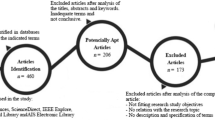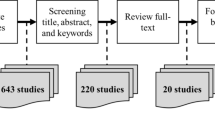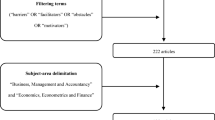Abstract
Although many theories regarding the implementation of knowledge management (KM) in organizations have been proposed and studied, most applications tend to stand alone without incorporating the business processes. Different categories of knowledge provide different benefits and how to integrate various categories of KM into a hybrid approach as an effective KM manner remains strategically important, and yet is still understudied. Therefore, in this paper a hybrid model that integrates principal KM applications for new service development (NSD) and the measurement of the resulting financial benefits have been developed. The proposed KM model incorporates newsgroups, knowledge forums, knowledge asset management and knowledge application processes as a hybrid means for sharing organizational knowledge along two axes, explicit vs. implicit and individual vs. collective. One of the largest management consulting companies in Taiwan, China, whose process model of NSD was standing alone with KM applications, was selected for the case study. A set of hybrid KM processes was developed to implement the proposed KM model, and it illustrates an application with greater financial benefits for integrating hybrid KM practices into the business process. Based on knowledge value added (KVA) validation, the proposed KM model provides a new operating system for sharing NSD knowledge within an organization. Through the case study by measuring the achieved financial results, the proposed KM model is found to provide an exclusive hybrid platform with an empirical process model to address innovative approaches and practical values of KM within an organization.
Similar content being viewed by others
References
Alsadhan, A.O., Zairi, M. & Keoy, K.H.A. (2008). From P Economy to K Economy: an empirical study on knowledge-based quality factors. Total Quality Management and Business Excellence, 19(7–8): 807–825.
Andersen, A. (1996). The Arthur Andersen Knowledge Management Practice Book. Arthur Andersen and the American Productivity and Quality Center, Chicago.
Andreu, R. & Sieber, S. (2005). Knowledge integration across organizations: how different types of knowledge suggest different integration trajectories. Knowledge and Process Management, 12(3): 153–160.
Asoh, D., Belardo, S. & Neilson, R. (2002). Knowledge management: issues, challenges and opportunities for governments in the new economy. In R. Sprague (ed.), the 35th Hawaii International Conference on System Sciences, p. 129, Island of Hawaii, January 7–10, 2002, IEEE Press.
Bautista-Frias, L., Romero-Gonzalez, R. M. & Morgan-Beltran, J. (2012). Knowledge maps in the conversion of tacit knowledge as a competitive strategy. Advances in Competitiveness Research, 20(3/4), 47–58.
Belardo, S. (2001). Learning Organizations and Knowledge Management: A Conventional and Alternate View, Advanced Info. Systems Techniques Course Lecture Series, SUNY/Albany.
Bitran, G. & Pedrosa, L. (1998). A structured product development perspective for service operations. European Management Journal, 16 (2): 169–189.
Bullinger, H.-J. & Schreiner, P. (2006). Service engineering: ein rahmenkonzept für die systematische entwicklung von dienstleistungen. Service Engineering, 53–84.
Chen, C.Y. (2012). An innovative knowledge management learning cycle by lego NXT for science education. International Journal of Innovative Computing Information and Control, 8(1B): 791–798.
Chen, Z., Shepherd, M., Abidi, S.S.R. & Finley, G.A. (2006). Linking tacit knowledge in the pediatric pain e-mail archives and explicit knowledge in PubMed. The 39th Hawaii International Conference on System Sciences in Kauai, p.91b, Hawaii, January 4–7, 2006, IEEE Computer Society.
Cyr, S. & Choo, C.W. (2010). The individual and social dynamics of knowledge sharing: an exploratory study. Journal of Documentation, 66(6): 824–846.
Dixon, N.M. (2000). Common Knowledge: How Companies Thrive by Sharing What They Know (1st ed.). Boston Harvard Business School Press.
Du, M., Qiu, F. & Xu, W. (2011). Construction of enterprises’ financial knowledge management system (EFKMS). Procedia Environmental Sciences, 11(Part C(0)): 1240–1244.
Gammelgaard, J. (2010). Knowledge retrieval through virtual communities of practice. Behaviour and Information Technology, 29(4): 349–362.
Haas, R. & Hansen, M.T. (2007). Different knowledge, different benefits: toward a productivity perspective on knowledge sharing in organizations. Strategic Management Journal, 28(11): 1133–1153.
Holt, D.T., Bartczak, S.E., Clark, S.W. & Trent, M.R. (2007). The development of an instrument to measure readiness for knowledge management. Knowledge Management Research and Practice, 5: 75–92.
Hou, D. & Li, L. (2011). Obstacles in using frameworks and APIs: an exploratory study of programmers' newsgroup discussions. Program Comprehension (ICPC), 2011 IEEE 19th International Conference, 91–100.
Housel, T.J. & Bell, A.H. (2001). Measuring and Managing Knowledge. McGraw Hill.
Housel, T.J. & Nelson, S.K. (2005). Knowledge valuation analysis: applications for organizational intellectual capital. Journal of Intellectual Capital, 6(4): 544–557.
Hussein, A.H. Megdadi, Y.A. & Mohammed, A.Z. (2010). The value of maps concept for knowledge management based on marketing personnel's view of Jordanian commercial banks. European Journal of Economics, Finance and Administrative Sciences, 26: 126–135.
Johnson, S.P., Menor, L.J., Roth, A.V. & Chase, R.B. (2000). A critical evaluation of the new service development process: integrating service innovation and service design. In: Fitzsimmons, J.A., Fitzsimmons, M.J. (eds.), New Service Development–Creating Memorable Experiences. Sage Publications Thousand Oaks, CA, 1–32.
Kankanhalli, A., Tan, B.C.Y. & Wei, K.K. (2005). Contributing knowledge to electronic knowledge repositories: an empirical investigation. MIS Quarterly, 29(1): 113–143.
Krishnaveni, R. & Sujatha, R. (2012). Communities of practice: an influencing factor for effective knowledge transfer in organizations. IUP Journal of Knowledge Management, 10(1): 26–40.
Laitamäki, J. & Kordupleski, R. (1997). Building and deploying profitable growth strategies based on the waterfall of customer value added. European Management Journal, 15(2): 158–166.
Lee, K.C., Lee, S. & Kang, I.W. (2005). KMPI: Measuring knowledge management performance. Information & Management, 42(3): 469–482.
Liu, L., Li, J. & Lv, C. (2009). A method for enterprise knowledge map construction based on social classification. Systems Research and Behavioral Science, 26(2): 143–153.
Macintosh, A. (1999). Adaptive Workflow to Support Knowledge Intensive Tasks, Working Paper, Artificial Intelligence Applications Institute (AIAI), Edinburgh, Scotland.
Marr, B. (2004). Measuring and benchmarking intellectual capital. Benchmarking: An International Journal, 11(6): 559–570.
Martinsons, M., Davison, R. & Tse, D. (1999). The balanced scorecard: a foundation for the strategic management of information systems. Decision Support Systems, 25(1): 71–88.
Martz, W.B. & Shepherd, M.M. (2003). Testing for the transfer of tacit knowledge: making a case for implicit learning. Decision Sciences Journal of Innovative Education, 1(1): 41–56.
Mas-Machuca, M. & Costa, C.M. (2012). Exploring critical success factors of knowledge management projects in the consulting sector. Total Quality Management, 23(11): 1297–1313.
Mason, J. (2005). From e-learning to e-knowledge. In M. Rao (ed.), Knowledge Management Tools and Techniques, pp. 320–328. London Elsevier.
Matsumoto, S., Ueno, N., Okuhara, K. & Ishii, H. (2009). Design of knowledge-based scheduling solution based on expert’s technical knowledge in printing process and proposal of its improvement. International Journal of Innovative Computing Information and Control, 5(11B): 4125–4143.
Mc-Donnell, A., Gunnlgle, P. & Lavelle, J. (2007). Organizational learning in multinational companies: explaining inter organization variations. Available via http://ulir.ul.ie/bitstream/10344/97/2/09KB3303.pdf.
Metters, R. D., King-Metters, K. H., Pullman, M. & Walton, S. (2006). Successful Service Operations Management (2nd ed.). South-Western College Publishing.
Muncer, S., Loader, B., Burrows, R., Pleace, N. & Nettleton, S. (2000). Form and structure of newsgroups giving social support: a network Approach. Cyberpsychology and Behavior, 3(6): 1017–1029.
Ng, P.K. & Jee, K.S. (2012). Innovating TQM, CE and KM for productive manufacturing in a Malaysian firm. Total Quality Management and Business Excellence, 23(9–10): 1089–1105.
Olapiriyakul, K. & Scher, J.M. (2006). A guide to establishing hybrid learning courses: employing information technology to create a new learning experience, and a case study. The Internet and Higher Education, 9(4), 287–301.
Othman, A., Yao, L., Mahdi, O. R. & Jing, W (2011). A novel statistical model assessing the self-performance of knowledge management within smes in China. Procedia Engineering, 15(0): 1758–1763.
Sharpton, T.J. & Jhaveri, A.A. (2006). Leveraging the knowledge of our peers: online communities hold the promise to enhance scientific research. PLOS Biology, 4(6): e199.
Shen, K.N., Yu, A.Y. & Khalifa, M. (2010). Knowledge contribution in virtual communities: accounting for multiple dimensions of social presence through social identity. Behaviour and Information Technology, 29(4): 337–348.
Skyrme, D. & Amidon, D. (1999). The knowledge agenda. In J. Hermans (ed.), The Knowledge Management Yearbook 1999–2000, pp. 108–125. Woburn, MA Butterworth-Heinemann.
Smith, E.A. (2001). The role of tacit and explicit knowledge in the workplace. Journal of Knowledge Management, 5(4): 311–321.
Smits, M. & De Moor, A. (2004). Measuring knowledge management effectiveness in communities of practice. The 37th Annual Hawaii International Conference, p.236–244, Hawaii, January 5–8, 2004, System Sciences.
Soon, L., Sarrafzadeh, M. & Williamson, K. (2010). Reusing knowledge in online forums: a pilot study. Libri, 60(2): 153–164.
Stein, E.W., Manco, M.P. & Manco, S.A. (2001). A knowledge-based system to assist university administrators in meeting disability act requirements. Expert Systems with Applications, 21(2): 65–74.
Studer, R., Benjamins, V.R. & Fensel, D. (1998). Knowledge engineering: principles and methods. Data and Knowledge Engineering, 25(1–2): 161–197.
Tsai, A. (2012). A hybrid e-learning model incorporating some of the principal learning theories. Social Behavior and Personality, 39(2):145–152.
Tsai, A. (2014). An empirical model of four processes for sharing organizational knowledge. Online Information Review, 38(2): 305–320.
Tsai, M.T., Li, E.Y., Lee, K.W. & Tung, W.H. (2011). Beyond ERP implementation: The moderating effect of knowledge management on business performance. Total Quality Management and Business Excellence, 22(2): 131–144.
Tseng, S. (2008). Knowledge management system performance measure index. Expert Systems with Applications, 34(1): 734–745.
Warkentin, M., Bapna, R. & Sugumaran, V. (2001). E-knowledge networks for inter-organizational collaborative e-business. Logistics Information Management, 14(1/2): 149–163.
Wei, F.H. & Chen, G.D. (2006). Collaborative mentor support in a learning context using a ubiquitous discussion forum to facilitate knowledge sharing for lifelong learning. British Journal of Educational Technology, 37(6): 917–935.
Whelan, E. & Carcary, M. (2011). Integrating talent and knowledge management: where are the benefits? Journal of Knowledge Management, 15(4): 675–687.
Wu, Y. L., Wu, C. C. & Yang, P.C. (2007). The use of knowledge value added to weigh the performance of information technology outsourcing. International Conference on Wireless Communications, Networking and Mobile Computing, WiCom 2007, pp: 5700–5704, Shanghai, 2007.
Yang, C.C. (2007). A systems approach to service development in a concurrent engineering environment. The Service Industries Journal, 27(5): 635–652.
Yasin, M.M. (2002). The theory and practice of benchmarking: then and now. Benchmarking: An International Journal, 9(3): 217–243.
Yu, W.D., Chang, P.L., Yao, S.H. & Liu, S.J. (2009). KVAM: model for measuring knowledge management performance of engineering community of practice. Construction Management and Economics, 27(8): 733–747.
Zwikael, O. & Globerson, S. (2007). Quality management: a key process in the service industries. The Service Industries Journal, 27(8): 1007–1020.
Acknowledgments
Thanks to the JSSSE referees’ professional and instructive guidance that helped the author to greatly improve the manuscript.
Author information
Authors and Affiliations
Corresponding author
Additional information
August Tsai holds a PhD degree in engineering management from University of Missouri-Rolla in Missouri, USA. He is a certified Lead Auditor for many ISO standards, and is currently registered Project Management Professional and Knowledge Management Professional. He has worked at the Chien Hsin University of Science and Technology in Taiwan, China, as an associate professor teaching e-commerce, project management and knowledge management. His main research interests include e-business, knowledge management and process-oriented system management. He was elected the president in the Association of Taiwanese Businesses for Internationalization and is currently the honorary president. In recent years, he has participated in many research projects funded by the academy jointly with the industry, and has published many significant papers in international conferences and some SSCI journals.
Rights and permissions
About this article
Cite this article
Tsai, A. A hybrid model of knowledge management for new service development. J. Syst. Sci. Syst. Eng. 25, 424–447 (2016). https://doi.org/10.1007/s11518-015-5280-2
Published:
Issue Date:
DOI: https://doi.org/10.1007/s11518-015-5280-2




